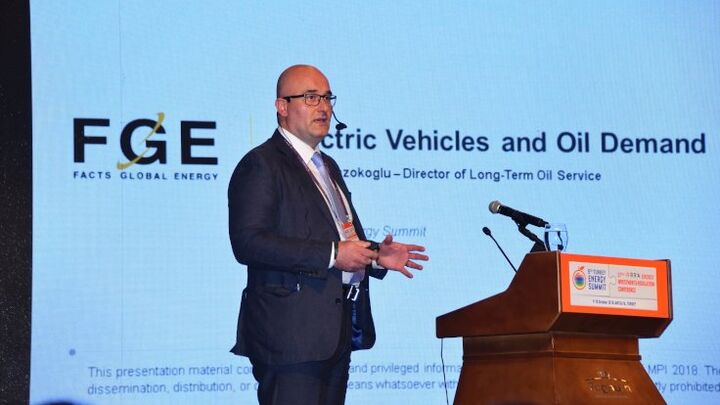Tehran(Bazaar): In vast areas of life, oil and gas cannot be replaced. Many people look at the electricity markets where solar and wind are growing strongly from a low basis and replace coal and draw conclusions for oil and gas, Cuneyt Kazokoglu , Director of Long-Term Oil Service in FGE, tells in exclusive interview with Bazaar.
Kazokoglu also says that If you consider the “electrifying” business can be done better by renewable electricity and battery companies, the easiest future path for oil and gas companies is to focus on hydrogen and areas of the energy matrix that are difficult to electrify and using their competitive edge herein.
Following is the full text of the interview:
Bazaar: What is your views about the peak oil? Are we there yet (as BP suggests) or oil demand will continue to grow for much longer upon recovery from COVID-19 ?
Kazokoglu: We don’t think that we have reached peak oil demand yet. Our base case is that oil demand will continue to grow until 2030s upon recovery from COVID-19. I don’t want to comment much about BP’s outlook but the global oil demand falls in 2020 was an artificial event, due to the lockdowns across the world. Structurally, nothing has changed. If you break the world oil demand into two categories of “industrial” and “personal mobility”, you would notice that “industrial” oil demand, i.e. oil demand from trucks, ships, commercial traffic etc. has already recovered to pre-pandemic level. The oil demand from “personal mobility”, i.e. private cars (gasoline) and airplanes (jet) are still down. This will recover once the vaccinations gain speed and the lockdowns are lifted. Overall, we expect global oil demand to return to 2019 level by first half of 2022.
Bazaar: What do you think about the ‘energy transition’ concept that is flying around so often these days among the oil companies? Are we approaching the end of popularity for ‘oil companies’ be it IOCs or NOCs?
Kazokoglu: Energy transition is a reality of our times but this has always been so. Historically, the world has transited from biomass to coal, from coal to oil and gas, and now it is a transition from oil/gas to renewables, at least in the electricity segment. The issue is driven by climate change politics putting the 1.5 or 2 degrees Celsius global warming as the top priority for energy policies.
For the IOCs, this becomes a problem as their shareholder’s demand action towards this target, which is not compatible with producing oil and gas. Most of them, esp. European companies, are now moving towards becoming integrated energy companies, diversifying their focus with vast amounts of renewable electricity generation and electric vehicle charging to offset their CO2 emissions from oil/gas production and consumption.
The problem is that we don’t think oil and gas demand will decrease during the next decades, as I mentioned above, peak oil demand will probably not come until 2030s. In vast areas of life, oil and gas cannot be replaced. Many people look at the electricity markets where solar and wind are growing strongly from a low basis and replace coal and draw conclusions for oil and gas. This is a wrong approach.
- In road transport, electric cars are an option, but they are still very costly and subject to huge government subsidies, so they cannot reach big volumes in major markets apart from Europe and China.
-In air transport, it is literally impossible to come up with an electric or alternative airplane during the next decade or two
-In shipping, vast majority of the world vessel fleet will still run on oil for considerable amount of time
-In plastics/petrochemicals, recycling will play only a marginal role
So overall, especially the European IOCs will show good will and virtue that they are transitioning, due to the pressure from investors and politicians. The share of “non-oil/gas” business in their portfolio will rise. At the same time they will not give up their core business in order to generate cash flow to finance the new business areas and because there is still demand for these products.
For NOCs, it is a bit different, as in most countries outside Europe, the political pressure is not as strong. Overall, the NOCs will deal with this problem much better than IOCs and increase their market share during the next years.
Bazaar: How do you see the role of Hydrogen in the energy mix for the world as part of this transition?
Kazokoglu: There is a limit for decarburization, i.e. replacing oil/gas/coal with carbon-free sources. Electricity can be decarbonized to some extent with solar/wind, road transport can be decarbonized to some extent with electric vehicles, but vast areas of energy use (airplanes, oceangoing ships, heavy industry, petrochemicals) cannot be electrified. For all these areas, hydrogen offers a good alternative. Hydrogen is very versatile, can be used for electricity storage, for gas blending, for fuel cells, for synthetic liquid and gaseous fuel production etc.
The problem with hydrogen at the moment is that its price, compared with the current alternatives is high, especially when it comes to “green hydrogen” that is hydrogen produced from renewable electricity. In other words, the hydrogen production process should become much cheaper or the current production of carbon-based fuels should become much more expensive to make expensive green hydrogen compatible.
So yes, hydrogen will play a role in the energy mix going forward, but my view is that role will be limited to the areas that are hard to electrify easily.
Bazaar: Lastly, do you think ADNOC’s plans to start H2 production suggests oil companies may be a key player in a H2 market (like they are in oil market) in future?
Kazokoglu: To what extent ADNOC specifically will become a key player in H2 market, will depend on a lot of factors. Domestically, hydrogen will help to reduce ADNOC’s own CO2 emissions from operations but also ADNOC plans to export hydrogen to Japan, which has itself a big hydrogen policy lined up to decarbonize its economy until 2050. The problem here is that another key player in H2 market, Australia, is much closer to Japan and is already using this trade.
However, in general oil and gas companies know how to handle “molecules”, while electricity and battery business is about “electrons”. Hydrogen, as a gas, is not unsimilar to natural gas, liquid hydrogen is not unsimilar to LNG for example. So oil and gas companies have a huge technical advantage as they are already experts in handling these molecules. If you consider the “electrifying” business can be done better by renewable electricity and battery companies, the easiest future path for oil and gas companies is to focus on hydrogen and areas of the energy matrix that are difficult to electrify and using their competitive edge herein.















نظر شما